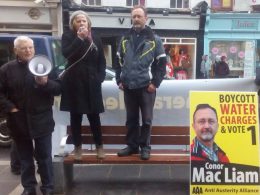“Introducing a property tax will prove one of this Government’s most difficult challenges. It may even prove intractable.” – Noel Whelan, Irish Times, 1 September. The Government’s new property tax will hit households many times harder than this year’s household tax. The International Monetary Fund have called on the Government to introduce the property tax at a “suitably high” rate.
The Government have yet to unveil the exact details but we can safely say that the average property tax bill will be more than double the household tax, probably more than triple and possibly more than quadruple. The new tax should really be called a “home tax” rather than a property tax. The bulk of the money raised from it will be raised from taxes on the homes of low and middle income families rather than from the mansions of the super-wealthy.
Nor will the monies raised from it be used to improve life for ordinary people through the provision of jobs or better public services. Instead, the bulk of the monies raised will be use to provide 100% cover for the bank bondholders on their bad gambling debts. On 3 September the government paid Anglo bondholders the sum of €600 million and on 1 October AIB bondholders stand to receive €1 billion.
This would be equal to two years property tax at €500 per annum if 1.6 million properties were targeted for the tax.
The government will argue that property taxes are the norm in Europe. But up until recently free healthcare, cheap childcare provision and a high standard of public services have been the norm in Europe too. Fine Gael and Labour are proposing European-style taxation rates for services that fall far far below what they like to call the “European norm”.
They will also argue that property tax is a “progressive tax” and will cite the fact that the tax will be greater for more valuable properties. But they will have to explain what is progressive about hitting low and middle income working families for a combined sum of hundreds of millions of euro in order to fund a bank bailout. If they had any genuine interest in progressive taxation they would abandon plans for a property tax and introduce instead a wealth and assets tax on the super-wealthy which would include the mansions of society’s elite.
The government have announced that the Revenue Commissioners will be given the job of collecting the property tax. In so doing they are trying to create the impression that “resistance is futile”.
However, this is far from the case. More than 700,000 households have refused to pay the household charge. By taking this stand, these households have refused to register and give the Government the information they need to build a credible database for both the property tax and the water tax. If the government are planning a “get tough” strategy for property tax collection, it is all the more reason why these 700,000 households should hang tough and refuse to give them the information they want so badly. Property tax plus water tax can equal €1000 a year very quickly,far from being futile, resistance is the only realistic response.












